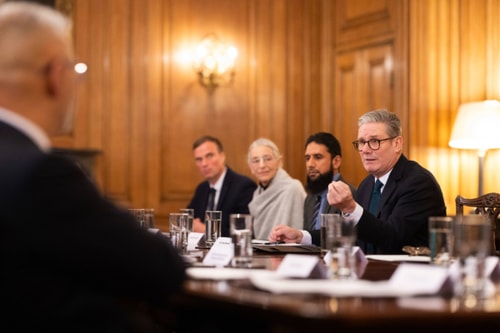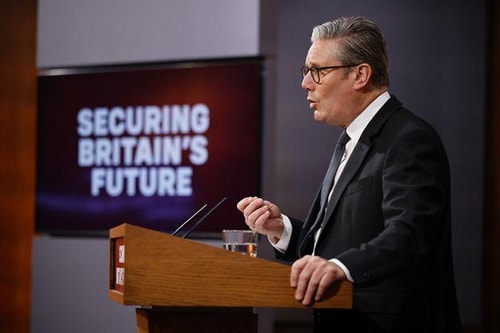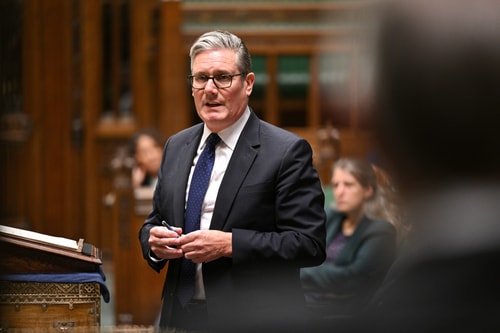411 Labour MPs, up from 209 in the 2019 election and a working majority of 165 – the 2024 election was a huge success for Labour and began well. However, since the Autumn statement, the government’s popularity has tailed off significantly, but why is that?
It is my view that the prime minister needs to shift his political focus from international statesman, where he has been more comfortable leading on the global stage, to driving the government’s domestic agenda. Labour’s first year in government has been chaotic and confusing at times and needs greater clarity, in how under his leadership, the government will address rising inequalities, grow the economy and bring divided communities together.
Tuesday’s vote on the government’s Universal Credit and Personal Independent Payment Bill illustrates how fragile Sir Keir’s authority is amongst Labour colleagues. Following several hours of debate, two proposed reasoned amendments (as to why the bill should not proceed second reading) and impassioned speeches from Labour backbench MPs at their disbelief in the government’s approach, the prime minister was still willing to move forward.
In the days leading up to the one-year election anniversary the prime minister has been interviewed by several newspapers where he reflects on his tenure and areas of improvement. In The Times, the prime minister discussed the government’s need to make concessions over the welfare reform bill: “All these decisions are my decisions, and I take ownership of them.” Contrition in politics is rare and should be commended when acknowledged.
However, several policy U-turns in recent months (e.g., winter fuel payment, welfare reform and national inquiry into grooming gangs) have weakened public confidence in his leadership and shown a cabinet not quite ready to govern, despite having 14 years in opposition to prepare. The cost of indecision has left many anxious about how they will pay for rising energy, food and council tax bills now and in the future.
In Proverbs 29:18 we are taught where there is no vision, the people perish and it is fair to conclude a lack of political vision, clearly articulated through coherent policy proposals has contributed to low opinion ratings for Labour. At the time of writing this, Labour is polling third in the polls and the prime minister’s approval rating is on the decline. Whatever your political preference, the scriptures command us to seek the peace and prosperity of a nation and to pray for those in political authority. Whilst parliament has forgotten God, may His church call out to Him during this time for mercy and grace.
Last year, Labour won a historic election and ran a manifesto commitment to “change” the state of the nation. A year later there are growing questions as to whether the prime minister is the one who can deliver positive change and national renewal promised during the election campaign.
As evangelicals we know and are convinced that social, political and national renewal can only come through the cross of Christ and Him ushering in the fullness of His kingdom. But as we await His return, I want to set out how the prime minister and other cabinet ministers could look to Jesus’ leadership and model decisions on His example.
"If you voted for Labour yesterday, we will carry the responsibility of your trust, as we rebuild our country. Whether you voted Labour or not in fact – especially if you did not, I say to you directly, my government will serve you. - Sir Keir Starmer’s first speech as prime minister on 5 July 2024."
Leading by serving others first and foremost
In two gospel accounts the authors note Jesus’ words in how He came not to be served, but to serve and to give His life as a ransom for many (Matthew 20:28 and Mark 10:45). Service to others is the strongest form of leadership and it is the church who has done this so consistently and faithfully for generations, particularly throughout years of austerity and the Covid-19 pandemic. During the election campaign Sir Keir wrote a letter to faith leaders where he promised under his government they would work closely with faith-based organisations and leaders. The Labour government must re-commit to its pledge to “ensure a strong partnership with faith communities.”
Those commitments were to:
- Appoint a government minister to lead on engagement with faith communities.
- Engage faith-based organisations in the delivery of our five missions.
- Promote local faith covenants to facilitate partnerships between local authorities and faith groups in communities.
- Continue to utilise our network of parliamentary faith champions to enhance our engagement with faith communities.
Here at the Evangelical Alliance, we have met with the prime minister in Downing Street to discuss the role of churches to encourage unity within communities affected by the riots and have also met with Lord Khan of Burnley, faith minister, to discuss the positive involvement of Christian charities in children and young people’s education and reduced freedoms in the Children’s Wellbeing and Schools Bill.
We are also pleased to see several member organisations have been hosted at reception events at Downing Street, but these invitations cannot overshadow how little progress has been made in establishing a working partnership across different policy areas. In the autumn last year, the department of culture media and sport launched the Civil Society Covenant Framework and we have written to them to express our disappointment that faith groups were not referenced despite pledges of “strong partnership” prior to the election. This is an area we hope the government will address going forward.

In addition, there is a role for the UK government to serve national parliaments in complex areas of governing.
Several months after the general election, the prime minister created the Council of Nations and Regions, a forum where the first ministers from Scotland, Northern Ireland and Wales discuss economic growth and in-country investment. These meetings have continued and are chaired by Pat McFadden, the chancellor of the duchy of Lancaster, but in terms of their effectiveness to address national crises, it is lacking.
Northern Ireland’s anti-poverty strategy launched only a month ago, has received strong criticism with over 50 charities calling for it to be dropped. In Scotland, the country continues to have the highest drug deaths in Europe and the Welsh Government are struggling to develop a social housing strategy that responds to local needs. The UK government could play a more intentional role in supporting each administration to respond to national concerns.
Lead with conviction
Jesus said He came to seek and save those who were lost (Luke 19:10). His mission never shifted despite opposition from the religious leaders of the day or even misunderstandings from His own disciples. Jesus remained focus on the Father’s mission and followed it through till the end.
In the beginning of Sir Keir’s premiership, the government had “six missions” then the rhetoric shifted to “first steps” and now many cabinet ministers’ media interviews contain the phrasing “plan for change.” It would seem that the prime minister has struggled to articulate a political vision and to lead with political conviction.
In the interview with The Observer, the prime minister stated he “deeply regrets” his “island of strangers” speech and went on to say he would not have used such words had he of known they would be misheard as echoes of Enoch Powell’s “rivers of blood speech.” I can accept government ministers need the input of speechwriters for their numerous public appearances. However, on an issue so polarised and a subject so emotive to this nation, this mistake was made because the prime minister was reacting to a moment rather than leading from a place of political conviction.

In the government’s first year in office many decisions have come across as wanting to appease and appeal to a specific segment of the UK electorate, rather than casting a consistent political vision.
Take for example the week the “island of stranger” speech, given on 12 May. This was Labour’s attempt to respond to rising popularity in Reform in currently held Labour seats and to reassert Labour as party that will address migration. Within three days, the prime minister announced the UK-India trade deal where there will be tax breaks for Indian companies and in-so-doing making it cheaper to hire foreign workers and a new European youth mobility scheme as part of an EU deal. Both political decisions seeming to prefer the affluent rather than the average worker in the UK. These decisions are difficult to understand and only fuel resentment towards politics and politician, particularly for communities across the UK where unemployment is high and social mobility amongst the young is restricted.
It is important for the prime minister to show international leadership, but I also believe more needs to be done in providing opportunities for the next generation and to tackle regional wealth inequality.
Lead with grace and truth
The opening chapter of John’s gospel is a beautiful read, in particular verse 17, where the apostle states Jesus came full of grace and truth. No-one apart from Jesus can embody in equal measure grace and truth and it’s only by the Holy Spirit that believers can imitate this quality, but there is something to be said about truth in politics and I am concerned the prime minister’s appeal to “progressive politics” will do more harm than good.
In an interview with The Observer the prime minister said, “We have to be the progressives fighting against the populists of Reform – yes, Labour has to be a progressive political party.” Progressive ideas that underpin social policy reform will lead to an unjust society where the most vulnerable in society are exploited. The recent vote to decriminalise abortion and support at third reading to legalise assisted suicide is a case in point.
Ideals of autonomy and choice has resulted in the unborn child’s last legal protections being removed and a plethora of marginalised groups likely to have a wrong death because it is cheaper to assist in dying than it is to provide adequate care to assist individuals to live or have a dignified natural death. Where politicians have chosen death, it is incumbent upon the church to repent for such decisions and urge politicians, including the prime minister, to pursue righteousness in how they govern.
The truth, as revealed throughout scripture, is that God cannot bless where the weak are enslaved or innocent lives lost. As a nation we deserve judgement, but the good news assures us He is merciful to forgive all those who seek Him. So, as the church in these lands, let us pray for the mercy of Christ to prevail.

Evangelical Alliance writes to Sir Keir Starmer on becoming prime minister
Following the Labour Party's victory in the general election, Gavin Calver, CEO of the Evangelical Alliance, has written to the new prime minister.



